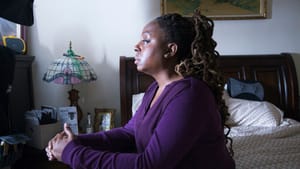Stay in the Loop
BSR publishes on a weekly schedule, with an email newsletter every Wednesday and Thursday morning. There’s no paywall, and subscribing is always free.
Unique tales of resistance
BlackStar Film Festival presents "Shorts Program 4"

Resistance is not just a struggle between social and political forces; it can be an internal battle between the mind, body, and an individual’s sense of self. That’s how some directors highlighted resistance in their films during the sixth annual Blackstar Film Festival.
A celebration of independent black cinema, Blackstar has provided a platform for black artists to showcase their artistry in an inclusive environment since 2011. This is especially true for female storytellers. Many of this year’s films were directed by women who unpack the nuances of opposition with intensity and fervor. Their approach helped me see that resistance means different things to different people. For some, it’s leading a charge against “the man,” but for others it’s about leading a charge against the demons that haunt you.
This notion was most evident in the short films Intercept, directed by Jackie J. Stone; Covered, directed by Desha Dauchan; and The Tale of Four, directed by Gabourey Sidibe. What was most profound about these films was their deep examination of the troubles plaguing many black women in their roles as mothers, daughters, aunts, sisters, and friends, navigating a flawed and unjust world. Each woman depicted in the films showed a resiliency and strength that surfaced when everything around them failed.
A battle within
Intercept tells the story of Chloe, a successful black woman with an outwardly beautiful life: designer shoes, dependable friends, a love interest. Secretly, though, she has spiraled into a deep depression. At one point, Chloe looks directly at the camera and admits that she feels like a burden and wants peace.
As the film progresses, the viewer sees that Chloe can no longer refute her personal monsters. When she yields to them and attempts suicide, her best friend finds her in the middle of the act and rescues her just in time. There are interesting moments in the film where the camera switches perspective. The audience becomes a mirror looking directly at Chloe and sees her as she sees herself: broken.
Unearth yourself
While Intercept tackled the burden of resistance, Covered challenged viewers to resist the urge to forfeit one’s identity. In the short, we meet a Muslim woman named Leah who is consumed with uncovering something buried in her unkempt backyard. She begins to exhume items, such as a pair of earrings and a red scarf, until she finally reveals her own smiling visage buried in the dirt.
What struck me about the film was the freedom Leah has to rediscover who she is. There are moments when her duties as wife and mother hinder her excavation. But in the end, her husband Jamal joins her and helps her complete the task. The idea that self-exploration is not only necessary for women but can be supported by the people in our lives is something I rarely see addressed in films. In many cases, women face guilt and shame for attempting to climb back into themselves. Leah, however, is allowed to revive her sense of self liberally, without apology, and with the help of her partner.
“I’m not gonna let them tell our story”
In Sidibe’s A Tale of Four (an adaptation of Nina Simone’s “Four Women”), a woman named Peaches prepares for battle as she sets out to avenge her son's death at the hands of a white police officer. The film also follows the journeys of three other women: Aunt Sarah, raising her niece and nephew while mourning the loss of her husband; Saffronia, a biracial woman yearning to uncover the truth about her father; and Sweet Thing, an artist who is having an affair with a married man.
Of the stories, Peaches’s narrative feels most urgent. Most of her scenes happen in a small room with images of her son and news clippings hanging on a wall. She recites a passionate monologue about how she raised a capable, educated son who has now become a hashtag — a symbol of a moment — but is much more than that to her. Although the viewer never learns about the events surrounding Peaches’s son’s death, her message is clear: the black community must come together to prosper and must take ownership of their narrative.
Watching each of these films, I could identify in some way with each character. As a black woman, I have masked deep feelings of pain, have struggled to unearth my identity in schools or jobs where most people don’t look like me, and have felt the frustration and pain that comes with watching black men, any of whom could be my brothers, uncles, cousins, and friends, being marked as criminals and shot down in the street. Unlike any other film experience I have had, Blackstar made it possible for me to sit in a theater and find my story in each of the stories presented — what a rare and beautiful gift.
What, When, Where
Shorts Program 4. Covered, Desha Dauchan directed; Intercept, Jackie J. Stone directed; The Tale of Four, Gabourey Sidibe directed. Sixth Annual BlackStar Film Festival. August 5, 2017, at International House, 3701 Chestnut Street, Philadelphia. (267) 603-2755 or blackstarfest.org.
Sign up for our newsletter
All of the week's new articles, all in one place. Sign up for the free weekly BSR newsletters, and don't miss a conversation.

 Jarreau Freeman
Jarreau Freeman